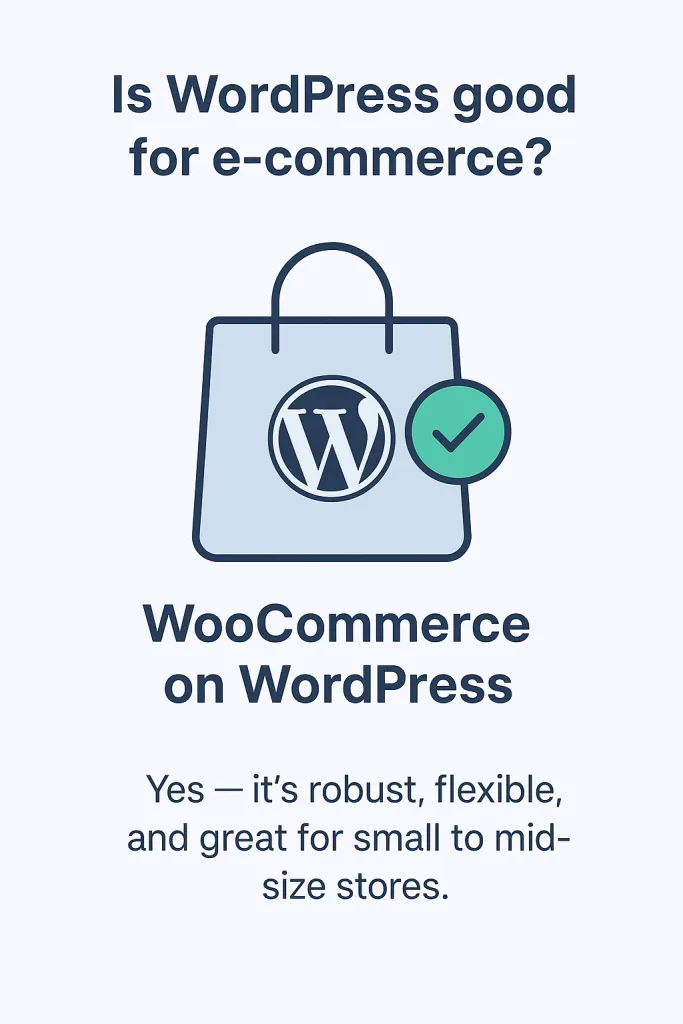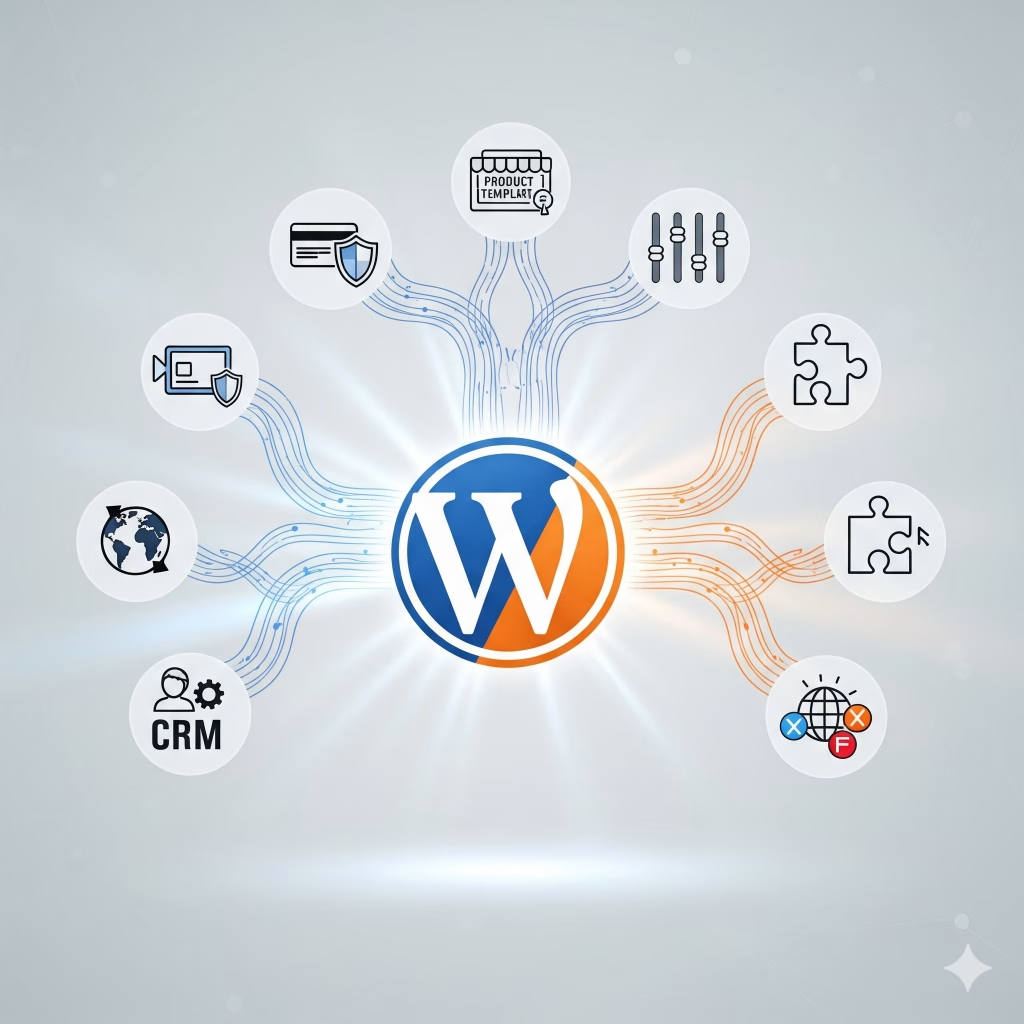
🛍️ Best Use Cases for WordPress + WooCommerce
- Niche online shops
- Small to medium-sized businesses
- Content-driven stores (e.g., blogs that also sell)
- Complex product customizations or subscription models
❌ When NOT to Use WordPress for E-Commerce
- You’re non-technical and want zero configuration → Use Shopify
- You need massive scale (100K+ SKUs, 10M+ traffic) → Consider Magento or BigCommerce
✅ Why WordPress Is Good for E-Commerce
🛒 WooCommerce Integration
- WooCommerce turns WordPress into a full-fledged online store.
- Supports physical + digital products, subscriptions, bookings, and more.
- Integrates with:
- Stripe, PayPal, Klarna, etc.
- Shipping (UPS, FedEx, etc.)
- Tax automation (via plugins like TaxJar)
🎨 Design Flexibility
- Use themes designed specifically for e-commerce (e.g. Astra, Flatsome).
- Full control over layout, product pages, and checkout flow.
- No lock-in to rigid templates like Shopify.
🔌 Massive Plugin Ecosystem
- SEO (RankMath, Yoast)
- Marketing (Mailchimp, HubSpot)
- Speed optimization (LiteSpeed Cache, WP Rocket)
- Custom product filters, live search, upsells, coupons
🔒 Control and Ownership
- Full control of hosting, data, and customization
- No transaction fees (unlike Shopify’s extra charges unless you use their payment processor)
MORE LINKS:
What is wordpress?
WordPress theming.
AI chatbot installation
Recommend a CMS
Who owns the CMS?
Updating wordpress
Managing content
Install plugins
WordPress security
IS WORDPRESS GOOD FOR ECOMMERCE?
Yes, WordPress can be a strong platform for e-commerce, especially when paired with WooCommerce. Together, they offer a flexible, scalable solution for selling products, services, digital downloads, or subscriptions. WooCommerce is the most widely used e-commerce plugin for WordPress, trusted by millions of businesses around the world. It turns your WordPress site into a fully functional online store with all the essential features you need to manage inventory, take payments, track orders, and handle shipping.
What makes this combination especially appealing is the level of control it gives you. Unlike many hosted platforms, WordPress and WooCommerce let you customize almost every part of your store. You can choose your own payment gateways, edit product templates, and install plugins that extend functionality in virtually any direction. Whether you need advanced filters, upsell tools, multilingual support, or integration with your CRM, the ecosystem around WordPress is large and well supported.
You’ll also benefit from the flexibility of content management that WordPress is known for. You can run a blog, publish landing pages, create lead magnets, and manage a content-driven marketing strategy all from the same dashboard that powers your store. This makes it an ideal platform for businesses that want to blend content with commerce and grow their brand over time.
To get the most out of WordPress for e-commerce, it’s important to set it up correctly from the start. This includes choosing a reliable host, securing your site, using a theme that supports WooCommerce, and installing the right performance and SEO tools. With a thoughtful setup, WordPress becomes a powerful and cost-effective platform for building and growing your online business.

Asking whether WordPress is good for e commerce is less about technology and more about how far users are willing to tolerate compromises. WordPress was built as a blogging platform that mutated into a general purpose CMS through layers of plugins and themes. The fact that it can run a shop at all is more a product of WooCommerce’s dominance than any original design. Calling it a dedicated e commerce platform is stretching the truth, since it carries legacy weight that constantly shows once traffic and inventory scale beyond hobby levels.
The main appeal is obvious. It is free to start, simple to install, and wrapped in an endless catalogue of extensions. This makes it attractive to small merchants who want a storefront with minimal investment. You can spin up a shop in an afternoon and call yourself an online retailer. But under that convenience hides a patchwork structure where every added plugin is a new dependency and every update carries the risk of breaking the entire site. Scalability is more a gamble than a guarantee.
Performance issues are a recurring theme. WordPress sites already struggle with speed when they carry just a blog and a theme, and bolting on e commerce introduces cart logic, product databases, and payment gateways that strain shared hosting. The result is slow page loads, abandoned carts, and frustrated customers. Owners who expected a simple expansion are forced into constant optimization rituals, caching layers, and CDN contracts just to keep the store functional.
Security tells its own story. Running e commerce means handling sensitive data, yet WordPress is a prime target because of its popularity and reliance on third party plugins. Each extension is a potential backdoor, and patches arrive only after vulnerabilities have been exploited in the wild. Serious operators end up paying for managed hosting, extra firewalls, and monitoring services to compensate for structural weaknesses. At that point, the “free” platform does not feel free anymore.
Cost inevitably rises. The base WooCommerce plugin might be free, but crucial features such as advanced shipping, subscriptions, or payment methods live behind paid extensions. Add in premium themes and performance plugins, and suddenly the supposedly budget friendly choice looks less like a bargain and more like a nickel and dime ecosystem. Meanwhile dedicated e commerce platforms bundle these features into their core offering without demanding piecemeal purchases.
⚠️ Limitations to Consider
| Concern | Solution |
|---|---|
| Slower out-of-the-box than Shopify | Use caching, CDN, optimized theme |
| Security is your responsibility | Use SSL, backups, anti-spam, firewall |
| Requires some tech familiarity | Choose managed WordPress hosting or hire help |


